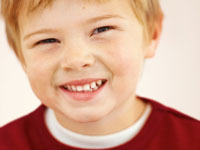Dealing with Child Dental Fears

They scream. They whine. They throw tantrums. It's no wonder many parents become so frustrated with their children's anxiety that they consider not taking them to a pediatric dentist at all. It's stressful, but perfectly normal.
Children experience dental anxiety just as adults do, and this fear is intensified by a sense of the unknown. They just don't know what to expect, and that's scary. You want to do what you can to put their minds at ease, but don't really know where to start. To really address these concerns, it's important to understand where dental anxiety originates in children. There are essentially two types of dental fear: objective and subjective.
Objective fear is created when a child goes to the family dentist and has a negative experience, such as feeling pain or not understanding precisely what's happening. The only way to overcome objective fear is to return to the dentist and replace these negative experiences with positive ones. Over time, a child should become more comfortable, their anxiety dissipating. Subjective fear, on the other hand, does not spring from actual experiences at all. It may be implanted by images of terrifying dentists on television, by playground horror stories or by sensing mom's anxiety before her own dental appointment.
Education is a parent's best defense against subjective fear. To relieve a child's pre-dentist anxiety, discuss the appointment in positive terms. For instance, explain that the pediatric dentist is a friend who will count, clean and examine his or her teeth using neat tools. Let children know that despite playground rumors, a dental exam is painless. There are a number of children's books that can help, but try to avoid those that discuss advanced procedures like fillings and extractions. Stick to the basics, and your family dentist will go from there. If you struggle with dental anxiety yourself, try not to let it show, or leave these lessons to somebody else. Children are very perceptive.
Next, consider taking your child to a pediatric dentist. Pediatric dentists are specially trained in dealing with child dental fears. They use techniques such as modeling (demonstrating procedures on fake jaws or stuffed animals) to alleviate anxiety, and explain everything in simple, fun terms that a child can understand. Beyond that, however, pediatric dentists understand child dental health needs, such as identifying problems related to thumb-sucking or baby bottle tooth decay. The experience could be just as educational for the parent as it is for the child.
Finally, for the sake of both your children's teeth and emotional well-being, it's best to bring them to the family dentist before their first birthdays. Establishing positive experiences from such a young age will squelch both objective and subjective fears before they even materialize. It will also ensure that the dentist can identify and treat child dental care problems and help to establish a proper dental regimen right from the start!

+Jim Du Molin is a leading Internet search expert helping individuals and families connect with the right dentist in their area. Visit his author page.
Dental Care and Baby Teeth, Something To Smile About

Your child's first baby tooth is another milestone in the growth of a child. Parents love to celebrate the tiny, yet momentous steps that pave a child's healthy development.
Babies are born with their primary teeth formed underneath the gums, but they don't start appearing until many months later, usually between six to seven months after birth; however, there is considerable variation in the timing. By the time children are three years old, they usually have a full set of 20 primary teeth
Around age six, your child's jaws begin growing to make room for the permanent teeth. The roots of the teeth anchor them in the bone. As the permanent teeth start to push their way to the surface, the roots of the baby teeth dissolve completely and then the teeth fall out (exfoliate). Eventually, the roots of each baby tooth lose their anchoring power and are nudged out.
Each baby tooth should be replaced by a permanent tooth. The growth that occurs in the back of the jaws creates space for the additional 12 permanent molars.
When Should Children's Dental Care Begin?
Children's dental care should begin within just a few days after birth. Right after each feeding, wipe your baby's gums and inside of the cheeks, roof of the mouth and tongue with a clean damp washcloth or wet gauze pad to remove plaque, the sticky film containing decay-causing bacteria.
As soon as teeth begin erupting through the gums, continue proper dental care by brushing them with a soft-bristled brush. Do not use toothpaste. Regularly check your baby's teeth for any changes. If you notice any white or stained areas, see a pediatric dentist. Around the age of three when each baby tooth has erupted, dental care can continue as you begin flossing your child's teeth (if there is no space between the teeth).
Never let your child fall asleep at naptime or bedtime with a bottle of anything other than water! Milk, fruit juice, formula, or sweetened liquids contain sugars and can cause cavities and make dental care more difficult.
Each Baby tooth is important to your growing child's long-term dental care and oral health. Dental care is simple, yet essential, for a happy, healthy smile.
Since Each Baby Tooth Will Fall Out Anyway, Why Is It Important To Care For Them?
The primary teeth pave the way for your child's permanent teeth. They serve as the foundation for a healthy mouth and gums and proper positioning of permanent teeth.
The primary teeth help children to chew easily, speak clearly and put a great looking smile on their faces. They also provide structure to help shape their faces. If a baby tooth becomes broken or decayed and are left untreated, that can affect your child's erupting permanent teeth, cause them pain and even contribute to other health problems.
Primary teeth serve as natural space maintainers, holding the space open until the permanent teeth are ready to take their place. If baby teeth are lost too early, the other teeth can drift out of their position and invade the empty space. This might cause permanent teeth to come in crooked or unable to erupt into the gum, which leads to malocclusion.
It also can cause a permanent tooth to erupt prematurely, which isn't good for your child's long-term dental health. Be sure to seek dental care if a baby tooth is lost too early.
by Brian J. Gray, DDS, MAGD, FICO

+Jim Du Molin is a leading Internet search expert helping individuals and families connect with the right dentist in their area. Visit his author page.














